 At the beginning of 2010 I was in Ukraine, and trying to understand what was going on there. Two contemporary historians, both dissidents, helped explain. Georgiy Kasianov writes in Ukrainian, Russian, and English; his history of post-independence Ukraine (in Russian) is a great and funny book that bravely resists the nationalist narrative pushed forward by the Ukraine-for-Ukrainians lobby. In English his edited volume, A Laboratory of Transnational History, is recommended. It includes an essay by John-Paul Himka, a Canadian historian of Ukrainian origin who has for a number of years kept up a lonely moral crusade against the nationalist elements of the Ukrainian diaspora in North America. You would think the margin for historical error in a territory and period as finite as Western Ukraine during the Second World War would be pretty thin; you’d be wrong.
At the beginning of 2010 I was in Ukraine, and trying to understand what was going on there. Two contemporary historians, both dissidents, helped explain. Georgiy Kasianov writes in Ukrainian, Russian, and English; his history of post-independence Ukraine (in Russian) is a great and funny book that bravely resists the nationalist narrative pushed forward by the Ukraine-for-Ukrainians lobby. In English his edited volume, A Laboratory of Transnational History, is recommended. It includes an essay by John-Paul Himka, a Canadian historian of Ukrainian origin who has for a number of years kept up a lonely moral crusade against the nationalist elements of the Ukrainian diaspora in North America. You would think the margin for historical error in a territory and period as finite as Western Ukraine during the Second World War would be pretty thin; you’d be wrong.
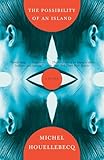
 I tend to read books in spurts. After Ukraine, I read a number of dystopian novels for an article I was writing. The best were Ishiguro’s Never Let Me Go and Houellebecq’s The Possibility of an Island. I preferred the Houellebecq. In fact, though Elementary Particles is still his best book, this one is his funniest. “In order to pass the time I told him the story of the German who ate the other German whom he’d met on the internet.” Very funny.
I tend to read books in spurts. After Ukraine, I read a number of dystopian novels for an article I was writing. The best were Ishiguro’s Never Let Me Go and Houellebecq’s The Possibility of an Island. I preferred the Houellebecq. In fact, though Elementary Particles is still his best book, this one is his funniest. “In order to pass the time I told him the story of the German who ate the other German whom he’d met on the internet.” Very funny.

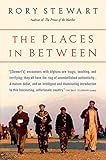 At this point, having settled again on American soil, I decided to figure out what was going on with our foreign wars. I read Rory Stewart’s amazing and funny book about walking through Afghanistan in the wake of the American defeat of the Taliban in late 2001 (The Places In Between), and then Megan Stack’s Every Man in This Village Is a Liar, which begins with her entering Afghanistan a bit earlier, right on the heels of the American invasion, tagging along with an Afghan warlord who will eventually try to sneak into bed with her. Stack’s book was so good that I could hardly believe it, so I read Dexter Filkins’ Forever War just to check. It was also very good. Forever War has more bombs exploding; Every Man has more of a comparative sweep.
At this point, having settled again on American soil, I decided to figure out what was going on with our foreign wars. I read Rory Stewart’s amazing and funny book about walking through Afghanistan in the wake of the American defeat of the Taliban in late 2001 (The Places In Between), and then Megan Stack’s Every Man in This Village Is a Liar, which begins with her entering Afghanistan a bit earlier, right on the heels of the American invasion, tagging along with an Afghan warlord who will eventually try to sneak into bed with her. Stack’s book was so good that I could hardly believe it, so I read Dexter Filkins’ Forever War just to check. It was also very good. Forever War has more bombs exploding; Every Man has more of a comparative sweep.
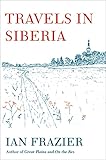
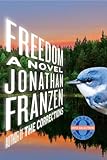 At this point, almost without intending to (I was waiting for someone to give me their copy of Freedom), I read Ian Frazier’s funny, epic, surprising Travels in Siberia. Then I read Freedom, which is as good as everyone says it is. Reading Frazier and Franzen back to back underscored, first, that they have quite similar names, and, second, the deeply Midwestern quality of Freedom. There’s a great passage at the end of the Siberia book in which Frazier talks about how his father used to berate him, back in his Ohio childhood, for living such a sheltered existence and knowing nothing about the rest of the world. This is a uniquely American, perhaps American-suburban, prejudice–the idea that Ohio couldn’t possibly be further away from, say, Siberia. What Frazier points out, in his quiet, uninsistent way, is that the center of the most economically powerful nation on earth can’t pretend that it’s far away from anywhere, much less one of the world’s largest oil-producing regions, which is what Siberia is. It seems that a deep awareness of the truth of this–of the interconnection of the American suburbs and the rest of the world–is one of Franzen’s important contributions to American fiction and American self-understanding over the past ten years.
At this point, almost without intending to (I was waiting for someone to give me their copy of Freedom), I read Ian Frazier’s funny, epic, surprising Travels in Siberia. Then I read Freedom, which is as good as everyone says it is. Reading Frazier and Franzen back to back underscored, first, that they have quite similar names, and, second, the deeply Midwestern quality of Freedom. There’s a great passage at the end of the Siberia book in which Frazier talks about how his father used to berate him, back in his Ohio childhood, for living such a sheltered existence and knowing nothing about the rest of the world. This is a uniquely American, perhaps American-suburban, prejudice–the idea that Ohio couldn’t possibly be further away from, say, Siberia. What Frazier points out, in his quiet, uninsistent way, is that the center of the most economically powerful nation on earth can’t pretend that it’s far away from anywhere, much less one of the world’s largest oil-producing regions, which is what Siberia is. It seems that a deep awareness of the truth of this–of the interconnection of the American suburbs and the rest of the world–is one of Franzen’s important contributions to American fiction and American self-understanding over the past ten years.

 In June, my book of interviews about the financial crisis with a hedge fund manager was coming out, and I realized I still knew nothing about the financial crisis. I read as fast as I could to avoid humiliation. Many of the books were bad. Their authors had the difficulty of writing from another country–like the Ukrainian historian Kasianov, who writes partly for Russians–but in a language that the people in that other country (that is to say, us) didn’t know. So they could either pretend that we knew it already, or treat us like idiots. They did a bit of both. The Michael Lewis books–his newest, The Big Short, and his oldest, Liar’s Poker–stood out among all these for their clarity and wit, although I should add that I haven’t yet read John Lanchester’s I.O.U. or Yves Smith’s ECONned, both of which are supposed to be good.
In June, my book of interviews about the financial crisis with a hedge fund manager was coming out, and I realized I still knew nothing about the financial crisis. I read as fast as I could to avoid humiliation. Many of the books were bad. Their authors had the difficulty of writing from another country–like the Ukrainian historian Kasianov, who writes partly for Russians–but in a language that the people in that other country (that is to say, us) didn’t know. So they could either pretend that we knew it already, or treat us like idiots. They did a bit of both. The Michael Lewis books–his newest, The Big Short, and his oldest, Liar’s Poker–stood out among all these for their clarity and wit, although I should add that I haven’t yet read John Lanchester’s I.O.U. or Yves Smith’s ECONned, both of which are supposed to be good.

 When the HFM book came out, I did mostly manage to aovid humiliation–for example, by sleeping through a scheduled radio interview. But non-humiliation was not enough. I decided to get to the bottom of things by reading Capital. But I couldn’t understand it. I began to read around Capital—David Harvey’s Limits to Capital; Peter Singer’s Marx; Immanuel Wallerstein’s Historical Capitalism; Michael Harrington’s The Twilight of Capitalism; Edmund Wilson’s To the Finland Station. The only one I really got through (aside from the Wallerstein book, which is like 100 pages long because he uses no examples) is To the Finland Station. I’d inherited the notion somewhere or other that Wilson’s book wasn’t first-rate as intellectual or political history. This is untrue. Of all the secondary sources on Marx, it has been the most valuable to me. It will certainly always be the most entertaining. It gives a different kind of genealogy of Marx, through the French historians rather than the German idealists, and also it has a beautiful and sympathetic account of the relationship between Marx and Engels. Just a lovely book, almost as good as Parallel Lives.
When the HFM book came out, I did mostly manage to aovid humiliation–for example, by sleeping through a scheduled radio interview. But non-humiliation was not enough. I decided to get to the bottom of things by reading Capital. But I couldn’t understand it. I began to read around Capital—David Harvey’s Limits to Capital; Peter Singer’s Marx; Immanuel Wallerstein’s Historical Capitalism; Michael Harrington’s The Twilight of Capitalism; Edmund Wilson’s To the Finland Station. The only one I really got through (aside from the Wallerstein book, which is like 100 pages long because he uses no examples) is To the Finland Station. I’d inherited the notion somewhere or other that Wilson’s book wasn’t first-rate as intellectual or political history. This is untrue. Of all the secondary sources on Marx, it has been the most valuable to me. It will certainly always be the most entertaining. It gives a different kind of genealogy of Marx, through the French historians rather than the German idealists, and also it has a beautiful and sympathetic account of the relationship between Marx and Engels. Just a lovely book, almost as good as Parallel Lives.
At around this time, about a month ago–and still stuck about a third of the way through the first volume of Capital–I concluded that I would never understand Marx’s obsession with the concept of “price” until I went back to Adam Smith and the original formulation of the theory of price that Marx is taking issue with. So that is where you find me today, about a fifth of the way through the first volume of The Wealth of Nations. Maybe a quarter of the way.
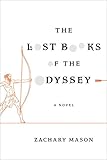
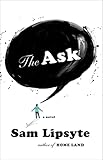
 Other great books I happened to read that came out in 2010 were Elif Batuman’s The Possessed; Sam Lipsyte’s The Ask; and Zachary Mason’s The Lost Books of the Odyssey. I recommend all three without reservation; they are instant classics. Another book I think everyone ought to read is Thomas Chatterton Williams’s Losing My Cool. It’s a complex, very honest, very entertaining memoir about a young man’s education that has not received anything like the serious consideration and discussion it deserves. And a final book I recommend from 2010 is And the Heart Says Whatever, by my very witty girlfriend, Emily Gould.
Other great books I happened to read that came out in 2010 were Elif Batuman’s The Possessed; Sam Lipsyte’s The Ask; and Zachary Mason’s The Lost Books of the Odyssey. I recommend all three without reservation; they are instant classics. Another book I think everyone ought to read is Thomas Chatterton Williams’s Losing My Cool. It’s a complex, very honest, very entertaining memoir about a young man’s education that has not received anything like the serious consideration and discussion it deserves. And a final book I recommend from 2010 is And the Heart Says Whatever, by my very witty girlfriend, Emily Gould.
More from a Year in Reading 2010
Don’t miss: A Year in Reading 2009, 2008, 2007, 2006, 2005
The good stuff: The Millions’ Notable articles
The motherlode: The Millions’ Books and Reviews
Like what you see? Learn about 5 insanely easy ways to Support The Millions









